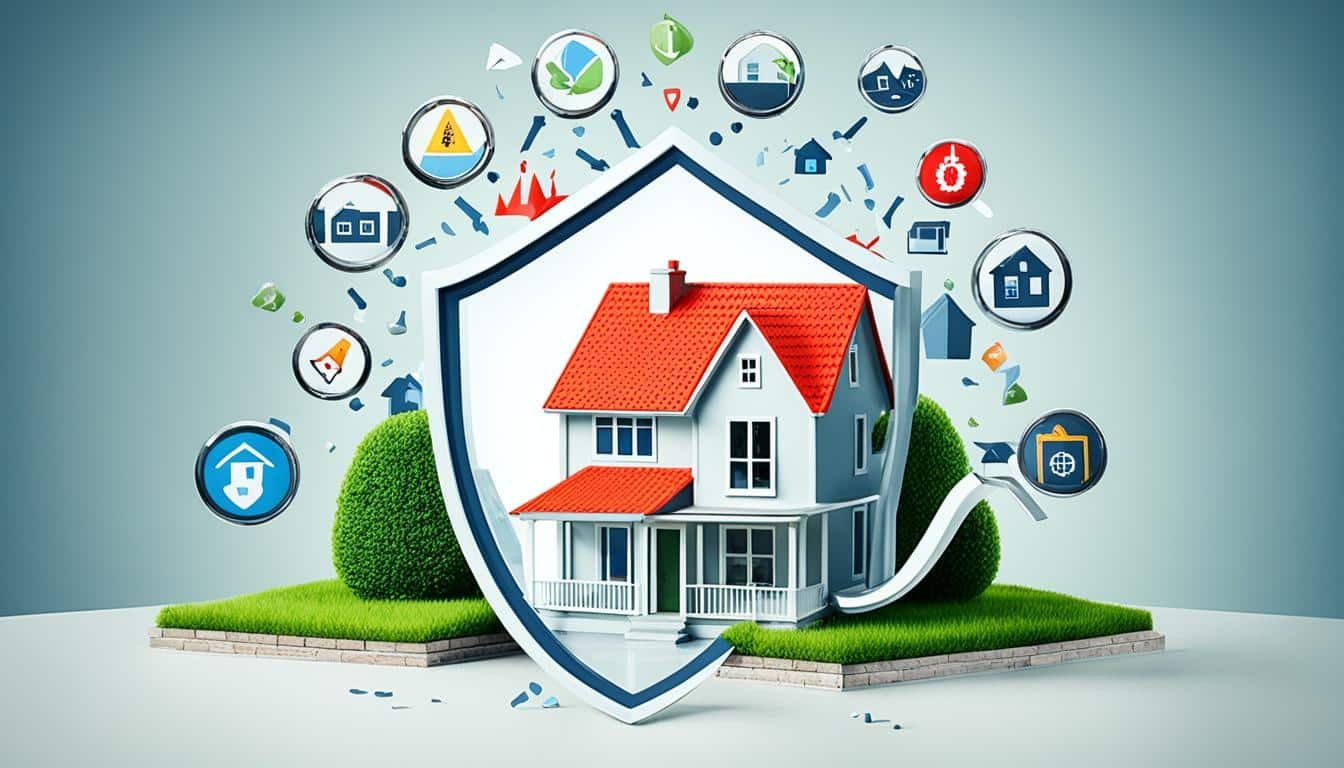Insurance House Understanding what your homeowners insurance doesn’t cover is as crucial as knowing what it does. Standard policies cover many dangers like fire, lightning, windstorms, and theft. But, there are risks not covered by these policies. Knowing these exclusions helps you decide if you need more insurance or how to lower these risks.
Key Takeaways
- Homeowners insurance policies often exclude coverage for floods, earthquakes, and earth movement.
- Maintenance issues and pest infestations are typically not covered by home insurance policies.
- Home-based businesses may have limited coverage for property and liability under a standard homeowners policy.
- Mold damage is commonly excluded from homeowners insurance, requiring separate coverage.
- High-value items may have coverage limits that require additional coverage or scheduled endorsements.
Common Home Insurance Exclusions
Homeowners insurance covers many risks, but it has exclusions too. Floods and earthquakes are two big ones. These exclusions can be a big problem for homeowners.
Floods
Standard homeowners insurance usually doesn’t cover flood damage. To get flood coverage, you need a flood insurance policy. This is usually from the National Flood Insurance Program (NFIP) or private companies.
This insurance helps cover costs for fixing or replacing property hit by floods. It also covers other flood-related issues.
Earthquakes and Earth Movement
Earthquakes and related issues like landslides and mudflows are often not covered by standard insurance. If you live in an earthquake area, you might need extra earthquake coverage.
You can get this from the California Earthquake Authority (CEA) or a private insurer. This way, your property is better protected.
It’s important to know about these exclusions and get the right coverage. This helps homeowners protect their homes and lessen the damage from natural disasters.
Maintenance and Pest Infestations
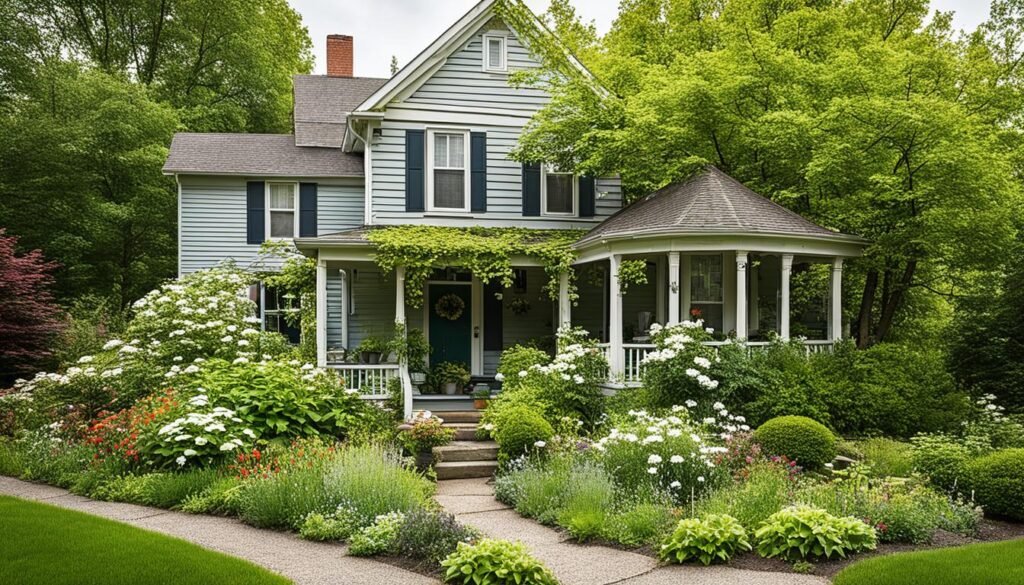
Home insurance policies have exclusions that can affect your coverage. One big exclusion is the lack of protection for general home maintenance and repairs. Homeowners are usually on their own for upkeep, including fixing appliances, plumbing, and electrical issues.
Another exclusion is damage from pests like termites, bedbugs, and mice. These pests can seriously harm a home. But, fixing the problem is usually not covered by standard home insurance.
To cover these gaps, homeowners might look into a home warranty or regular pest control services. A home warranty can help with fixing or replacing major home systems and appliances. Pest control services can prevent and manage infestations early on.
Being proactive with home maintenance is key to avoiding issues not covered by insurance. Regular checks and upkeep can spot and fix problems early. This can save homeowners from big expenses later.
In short, knowing what your home insurance doesn’t cover, like home maintenance and pest infestations, helps you make smart choices. It ensures you protect your home and get the most from your insurance.
Home-Based Businesses and Liability

Running a home-based business can save money and be convenient. But, you need to know your homeowners insurance limits for business. Most home insurance policies don’t fully cover business property and risks.
Limited Business Property Coverage
Homeowners policies often set a cap on business property coverage. This includes things like office gear, stock, or supplies in your home office. If your business faces a loss or theft, you might not be fully covered. You might need a separate business insurance policy or a business property add-on to your homeowners.
Liability Concerns for Home-Based Businesses
Liability is another big worry. If someone gets hurt at your place or because of your business, your homeowners policy might not cover it enough. This could leave you with big financial risks. To avoid this, consider adding a business liability add-on or getting a commercial liability policy.
Knowing what your home insurance doesn’t cover is key. Make sure you get the right business insurance to protect your home-based business and personal stuff. Talking to an insurance expert can help you find the best coverage for your needs.
“Protecting your home-based business requires careful consideration of your insurance needs. Don’t assume your homeowners policy provides comprehensive coverage for your business operations.”
Mold Damage and Exclusions
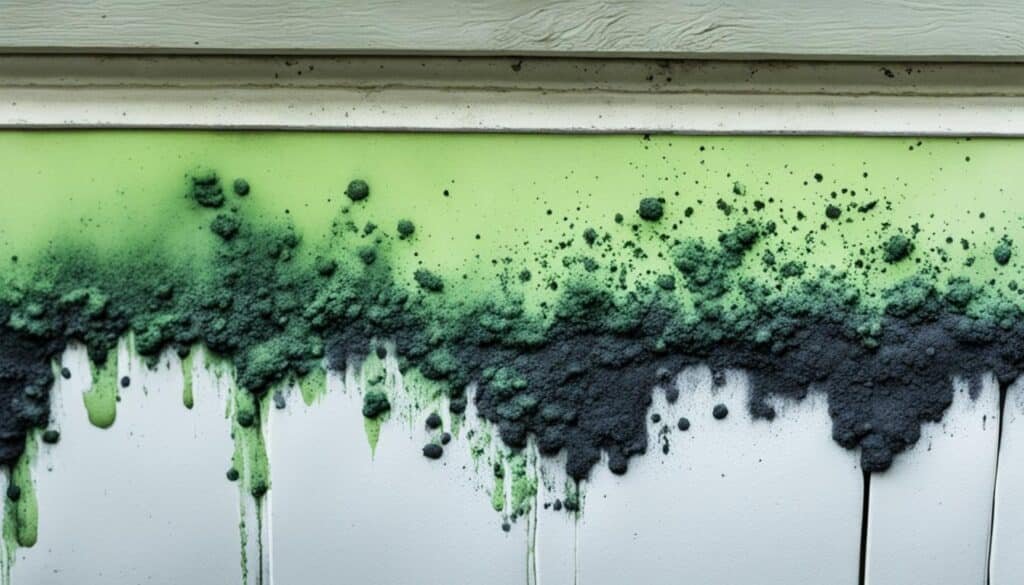
Homeowners often face unexpected challenges with mold coverage under their insurance policies. Mold can be a serious issue, leading to costly remediation efforts. But, standard homeowners insurance usually doesn’t cover mold, unless it comes from a sudden and accidental event like a plumbing leak.
Insurers see mold as a maintenance issue. It grows in damp, humid places and is often linked to water damage, leaks, or poor ventilation. These are problems that homeowners can prevent with good upkeep.
To get coverage for mold remediation, homeowners might need to look into special mold coverage endorsements or separate mold insurance policies. These options can help pay for mold damage and water damage not covered by standard homeowners insurance.
| Coverage Type | Mold Damage Included? | Typical Exclusions |
|---|---|---|
| Standard Homeowners Insurance | No, unless caused by a sudden and accidental covered event | Gradual or long-term water damage, poor maintenance, and mold growth |
| Mold Coverage Endorsement | Yes, with specific limits and sub-limits | Exclusions may still apply for mold caused by neglect or lack of maintenance |
| Standalone Mold Insurance Policy | Yes, with higher limits and broader coverage | Exclusions may still apply for mold caused by neglect or lack of maintenance |
Understanding mold coverage and exclusions helps homeowners make informed insurance choices. It also encourages them to prevent and manage mold issues in their homes.
High-Value Items and Coverage Limits

Many homeowners might be surprised to find their insurance doesn’t fully cover jewelry, art, and collectibles. Standard policies often have limits on these items. This means you could lose a lot of money if your valuables get stolen, damaged, or lost.
To protect your most valuable things, it’s key to know your insurance well. You might need to add a policy rider to your home insurance. This rider gives extra coverage for high-value items and their replacement value. Or, you could look into a special policy just for your collectibles and other high-value possessions.
| Item | Standard Homeowners Coverage | Policy Rider |
|---|---|---|
| Jewelry | $1,500 limit | Full replacement value |
| Art | $2,500 limit | Full replacement value |
| Collectibles | $2,500 limit | Full replacement value |
Reviewing your insurance and looking into policy riders can help. This way, your high-value items will be well-protected. You’ll have peace of mind and be financially secure if something unexpected happens.
insurance house

Looking through your homeowners insurance policy can seem tough, but it’s key to make sure your home and stuff are safe. By understanding policy exclusions and evaluating your coverage needs, you can talk with your insurance agent to fill any coverage gaps. This helps you make smart choices about extra coverage.
Understanding Policy Exclusions
Homeowners insurance usually has exclusions, which list what’s not covered. These can include floods, earthquakes, upkeep problems, and pest issues. It’s vital to check these exclusions well to make sure you’re covered.
Evaluating Your Coverage Needs
After seeing what’s not covered, it’s time to evaluate your coverage needs. Think about your home’s age and state, what your stuff is worth, and any businesses or special items at home. Your insurance agent can help with how much coverage you need and if you should get extra policies or endorsements.
| Coverage Area | Typical Exclusions | Potential Solutions |
|---|---|---|
| Floods | Homeowners insurance usually doesn’t cover flood damage. | Think about getting a separate flood insurance policy. |
| Earthquakes | Earthquakes and other earth movements are often not covered by standard homeowners policies. | Look into adding an earthquake endorsement to your policy. |
| High-Value Items | Homeowners policies might have limits on valuable things like jewelry, art, or electronics. | Get extra coverage or a rider for your high-value items. |
By taking the time to understand policy exclusions and evaluate your coverage needs, you can work with your insurance agent to make sure your policy review covers what you need for your home and stuff.
Regional and Location-Specific Exclusions
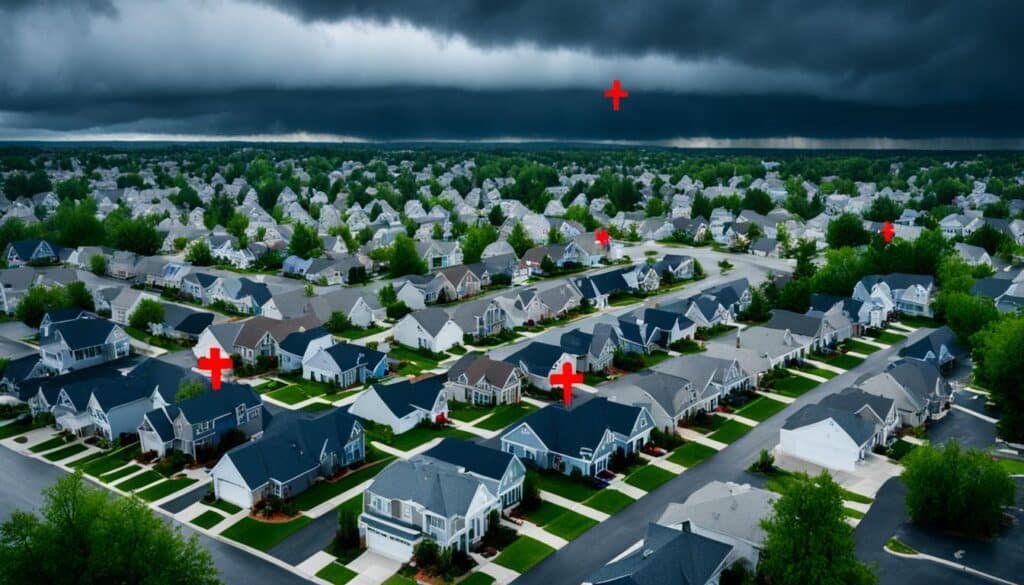
The place where your home is can change how much coverage you get with home insurance. Many policies have special rules based on where you live. This is especially true in places often hit by wind damage and hurricanes.
Wind and Hurricane Deductibles
People living in hurricane-prone areas might have to pay extra wind or hurricane deductibles. These can make you pay more out of pocket if you need to make a claim. It’s important to know about these location-specific exclusions when picking your home insurance. This way, you can make sure you’re well-protected.
| Region | Typical Wind/Hurricane Deductible | Average Claim Cost |
|---|---|---|
| Gulf Coast | 2-5% of home value | $15,000 |
| Atlantic Coast | 1-3% of home value | $12,000 |
| Pacific Northwest | 1% of home value | $8,000 |
The table shows the usual wind and hurricane deductibles and what claims cost in different regional exclusions across the U.S. If you live in a high-risk area, make sure to check your policy closely. You might want to get more coverage to keep your home safe.
Intentional Damage and Negligence
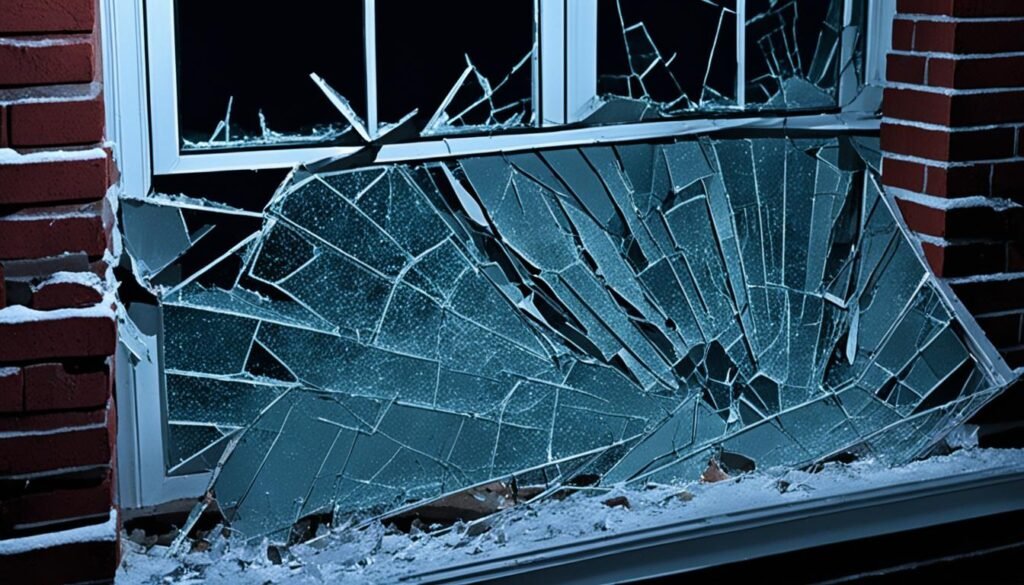
Homeowners need to know that insurance won’t cover damage caused by them or their family on purpose. Also, not keeping up with home repairs can lead to claims being denied.
Insurers don’t like intentional damage and negligence. They check claims closely and might deny them if the damage was avoidable or done on purpose. This could even mean being accused of insurance fraud.
Keeping up with home maintenance is key to avoiding problems. Homeowners should fix any issues quickly to prevent bigger damage later. This way, the insurance company won’t think the damage was preventable.
“Insurers take a hard stance against intentional damage or negligence, as they view these as a violation of the policyholder’s duty to protect their property.”
It’s vital for homeowners to know what their insurance doesn’t cover. Being proactive in maintaining their homes helps avoid surprises when filing a claim. By understanding these exclusions and acting responsibly, homeowners can make sure their insurance covers what they expect when something unexpected happens.
| Exclusion | Explanation |
|---|---|
| Intentional Damage | Damage or loss caused intentionally by the policyholder or a resident family member is typically not covered. |
| Negligence | Failure to properly maintain the home or address known issues can lead to the denial of claims related to the resulting damage. |
| Insurance Fraud | In cases where the insurance company suspects intentional damage or negligence, the policyholder may face allegations of insurance fraud. |
Also Read : Insurance and Loan Considerations for Electric Vehicle Owners
Conclusion
Homeowners insurance is key to protecting your property and assets. But, it’s important to know what’s not covered. By looking at your insurance house policy closely, you can fill in coverage gaps. This ensures you have the right protection for your needs.
Learning about exclusions for things like floods, earthquakes, and pests is crucial. It helps you see if you need more homeowners insurance or special policies. Knowing what’s not covered for businesses at home and valuable items can guide you on getting extra coverage or endorsements.
Being aware of policy exclusions and coverage gaps lets you make smart choices about your insurance house coverage. This way, you can protect your home and belongings with confidence. By looking into additional coverage options, you can make sure your insurance fits your property and location’s unique needs.
FAQs
Q: What are common exclusions in insurance house policies?
A: Common exclusions in insurance house policies may include damages from flooding, earthquakes, and normal wear and tear. It’s important to review your policy to understand what is not covered.
Q: How can I get an insurance quote for my home?
A: You can get an insurance quote for your home by contacting insurance companies, either online or over the phone. They will ask for information about your property to provide you with a quote.
Q: What does homeowners insurance coverage typically include?
A: Homeowners insurance coverage typically includes protection for your dwelling, personal property, liability coverage, and additional living expenses in case your home becomes uninhabitable.
Q: Are there any homeowners insurance discounts available?
A: Yes, homeowners insurance discounts may be available based on factors such as having safety features in your home, bundling your insurance policies, or having a good claims history. Contact your insurance company to see what discounts you may qualify for.
Q: How can insurance help protect my home and belongings?
A: Insurance helps protect your home and belongings by providing coverage in case of covered losses, such as damage from fire, theft, or other perils outlined in your policy. It can help you repair or replace items and rebuild your home if necessary.
Q: Why is liability coverage important in homeowners insurance?
A: Liability coverage in homeowners insurance is important because it protects you in case someone is injured on your property or if you accidentally damage someone else’s property. It helps cover legal fees and medical expenses that may result from such incidents.
Q: How can I file a homeowners insurance claim?
A: To file a homeowners insurance claim, contact your insurance company as soon as possible after a covered loss. They will guide you through the claims process, which may include providing documentation and working with adjusters to assess the damages.
Source Links
- https://www.bankrate.com/insurance/homeowners-insurance/homeowners-insurance-exclusions/
- https://www.policygenius.com/homeowners-insurance/home-insurance-exclusions/
- https://www.nerdwallet.com/article/insurance/home-insurance-exclusions
